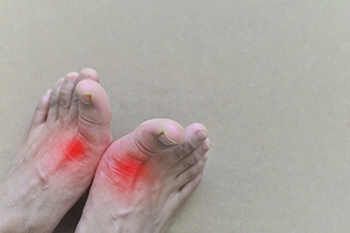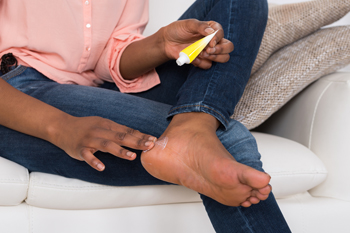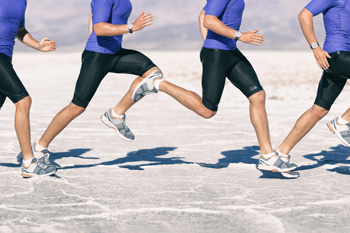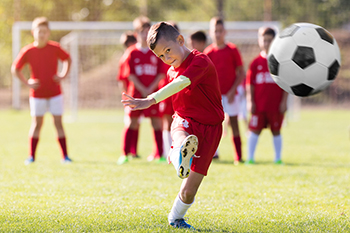Connect With Us
Blog
Items filtered by date: April 2023
Gout in the Foot

Gout is a type of inflammatory arthritis caused by the formation of uric acid crystals that settle in joints. High blood urate levels, or hyperuricemia, lead to crystal formation, and this can produce severe pain, stiffness, and swelling, often along the base of the big toe. One often has attacks of gout that can last from 12 hours to two weeks. If not tended to, gout can cause damage to joints, tendons, and other soft tissue that is irreversible. Hyperuricemia can also lead to kidney stones. Many people who suffer from gout have lifestyles, such as being overweight or eating or drinking items with high levels of purines or excess sugar or alcohol, that make them more vulnerable to gout. Those with some diseases, like anemia, psoriasis, and renal disease can also be more apt to get gout. Similarly, people taking certain medications can be more likely to get gout. Men are twice as likely to get gout than women. The chance of getting this ailment increases with age. If you have gout and you are experiencing pain in your big toe, it is suggested that you visit a podiatrist for an examination, treatment, and prevention techniques.
Gout is a painful condition that can be treated. If you are seeking treatment, contact Imaze Marian Davis, DPM from Marian Davis, DPM, PA. Our doctors will treat your foot and ankle needs.
What Is Gout?
Gout is a form of arthritis that is characterized by sudden, severe attacks of pain, redness, and tenderness in the joints. The condition usually affects the joint at the base of the big toe. A gout attack can occur at any random time, such as the middle of the night while you are asleep.
Symptoms
- Intense Joint Pain - Usually around the large joint of your big toe, and it most severe within the first four to twelve hours
- Lingering Discomfort - Joint discomfort may last from a few days to a few weeks
- Inflammation and Redness -Affected joints may become swollen, tender, warm and red
- Limited Range of Motion - May experience a decrease in joint mobility
Risk Factors
- Genetics - If family members have gout, you’re more likely to have it
- Medications - Diuretic medications can raise uric acid levels
- Gender/Age - Gout is more common in men until the age of 60. It is believed that estrogen protects women until that point
- Diet - Eating red meat and shellfish increases your risk
- Alcohol - Having more than two alcoholic drinks per day increases your risk
- Obesity - Obese people are at a higher risk for gout
Prior to visiting your podiatrist to receive treatment for gout, there are a few things you should do beforehand. If you have gout you should write down your symptoms--including when they started and how often you experience them, important medical information you may have, and any questions you may have. Writing down these three things will help your podiatrist in assessing your specific situation so that he or she may provide the best route of treatment for you.
If you have any questions, please feel free to contact our office located in Miami, FL . We offer the newest diagnostic and treatment technologies for all your foot care needs.
Severe Cracked Heels

Some foot conditions are mostly mild. This is to say that certain afflictions of the foot are not always accompanied by severe symptoms. Cracked heels are one such affliction of the foot. Many cases of cracked heels are mild, where fissures form on the back of the heel in an unsightly, yet mild, manner. However, there are some other cases of cracked heels that may be more severe for some patients. For example, some cases of cracked heels can result in painful sensations at the back of the heel. More severe cases of cracked heels might result in bleeding in this area. Persistent itching could also be another more severe symptom associated with cracked heels. If you are someone who is currently suffering from cracked heels, it is suggested that you contact a podiatrist today for more information and treatment.
Cracked heels are unsightly and can cause further damage to your shoes and feet. If you have any concerns, contact Imaze Marian Davis, DPM from Marian Davis, DPM, PA. Our doctors can provide the care you need to keep you pain-free and on your feet.
Cracked Heels
Cracked heels appear unappealing and can make it harder for you walk around in sandals. Aside from looking unpleasant, cracked heels can also tear stockings, socks, and wear out your shoes. There are several methods to help restore a cracked heel and prevent further damage.
How Do You Get Them?
Dry skin is the number one culprit in creating cracked heels. Many athletes, walkers, joggers, and even swimmers suffer from cracked heels. Age and skin oil production play a role to getting cracked heels as well.
Promote Healing
Over the counter medicines can help, especially for those that need instant relief or who suffer from chronic dry feet.
Wear Socks – Wearing socks with medicated creams helps lock in moisture.
Moisturizers – Applying both day and night will help alleviate dryness which causes cracking.
Pumice Stones – These exfoliate and remove dead skin, which allows for smoother moisturizer application and better absorption into the skin.
Change in Diet
Eating healthy with a well-balanced diet will give the skin a fresh and radiant look. Your body responds to the kinds of food you ingest. Omega-3 fatty acids and zinc supplements can also revitalize skin tissue.
Most importantly, seek professional help if unsure how to proceed in treating cracked heels. A podiatrist will help you with any questions or information needed.
If you have any questions, please feel free to contact our office located in Miami, FL . We offer the newest diagnostic and treatment technologies for all your foot care needs.
Gait Disorders in Seniors

Independent mobility is paramount to the quality of life for seniors. A senior’s gait and ability to rise comfortably from a chair, as well as walk and balance, are necessary for independent mobility. As one ages, their walking speed declines, especially after age 70. The speed of walking is known as gait velocity, which is a predictor of chronic medical conditions, hospitalizations, and even mortality. Calf muscles propel the body forward, and their strength lessens in older years. Many factors may affect the gait of older adults, including neurologic disorders like dementia, and musculoskeletal conditions, such as spinal stenosis. Seniors can participate in an exercise program that focuses on flexibility, strengthening, and balance to do what they can to maintain a good gait. If you are a senior, it is suggested that you see a podiatrist who can help you ensure the best biomechanics of the feet for a happier, healthier life.
If you have any concerns about your feet, contact Imaze Marian Davis, DPM from Marian Davis, DPM, PA. Our doctors can provide the care you need to keep you pain-free and on your feet.
Biomechanics in Podiatry
Podiatric biomechanics is a particular sector of specialty podiatry with licensed practitioners who are trained to diagnose and treat conditions affecting the foot, ankle and lower leg. Biomechanics deals with the forces that act against the body, causing an interference with the biological structures. It focuses on the movement of the ankle, the foot and the forces that interact with them.
A History of Biomechanics
- Biomechanics dates back to the BC era in Egypt where evidence of professional foot care has been recorded.
- In 1974, biomechanics gained a higher profile from the studies of Merton Root, who claimed that by changing or controlling the forces between the ankle and the foot, corrections or conditions could be implemented to gain strength and coordination in the area.
Modern technological improvements are based on past theories and therapeutic processes that provide a better understanding of podiatric concepts for biomechanics. Computers can provide accurate information about the forces and patterns of the feet and lower legs.
Understanding biomechanics of the feet can help improve and eliminate pain, stopping further stress to the foot.
If you have any questions please feel free to contact our office located in Miami, FL . We offer the newest diagnostic and treatment technologies for all your foot and ankle needs.
The Importance of Foot Care for Child Athletes

Though children’s feet may be small, they are complex structures. Taking care of them well early on can set children up for better foot health as they grow older. This is especially important if they play sports. The most important things to tend to in caring for children’s feet are well-fitting footwear, washing and drying feet well, and proper toenail cutting. Shoes that are the right size, comfortable, and appropriate for the activity are crucial to children’s foot health. Similarly, socks should fit well, be made of breathable material, and be changed often. Footwear should not be shared with other children to avoid the spread of infections and viruses that can impact feet, such as athlete’s foot and plantar warts. Kids should be taught to wash their feet thoroughly and dry them well to help prevent fungal and bacterial infections. Kid’s toenails should be cut straight across to ward off ingrown toenails. If you want to set your child up for a lifetime of foot health, particularly if they play sports, it is suggested that you take them to a podiatrist for regular checkups and to learn more about how to properly care for their feet.
Making sure that your children maintain good foot health is very important as they grow. If you have any questions, contact Imaze Marian Davis, DPM of Marian Davis, DPM, PA. Our doctors can provide the care you need to keep you pain-free and on your feet.
Keeping Children's Feet Healthy
Having healthy feet during childhood can help prevent medical problems later in life, namely in the back and legs. As children grow, their feet require different types of care. Here are some things to consider...
Although babies do not walk yet, it is still very important to take care of their feet.
Avoid putting tight shoes or socks on his or her feet.
Allow the baby to stretch and kick his or her feet to feel comfortable.
As a toddler, kids are now on the move and begin to develop differently. At this age, toddlers are getting a feel for walking, so don’t be alarmed if your toddler is unsteady or ‘walks funny’.
As your child gets older, it is important to teach them how to take care of their feet.
Show them proper hygiene to prevent infections such as fungus.
Be watchful for any pain or injury.
Have all injuries checked by a doctor as soon as possible.
Comfortable, protective shoes should always be worn, especially at play.
If you have any questions please feel free to contact our office located in Miami, FL . We offer the newest diagnostic and treatment technologies for all your foot and ankle needs.


